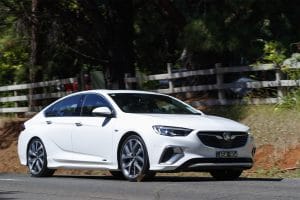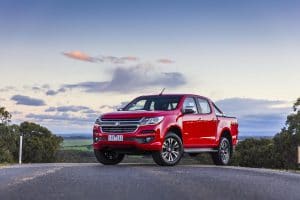
GM ended production of the Holden Commodore in 2017 when it closed its last Australian assembly plant.
General Motors will accelerate its global retrenchment by shutting down its Australian brand Holden, the automaker announced Monday, while also pulling the Chevrolet brand out of Thailand and selling its manufacturing complex there to China’s Great Wall Motors.
The moves come as part of a broader global downsizing GM has undertaken since Mary Barra came aboard as chief executive officer in 2014. What was the world’s largest automaker for more than 70 years has since pulled out of a variety of markets where it has been unable to sustain a profit, including Russia, South Africa and Europe, GM selling off its money-losing Opel-Vauxhall operation to France’s Groupe PSA three years ago.
“I’ve often said that we will do the right thing, even when it’s hard, and this is one of those times,” said Barra in a statement released Monday morning Australian time. “We are restructuring our international operations, focusing on markets where we have the right strategies to drive robust returns, and prioritizing global investments that will drive growth in the future of mobility, especially in the areas of EVs and AVs,” or electric and autonomous vehicles.
(Australia’s last car rolls off the Holden production line.)
GM has been paring back operations “Down Under” for some time, reflecting steadily dwindling sales. As recently as 2002 it held a 21.6% share of the Australian new vehicle market. By 2013, however, that dwindled to just 9.9%, leading the Detroit-based automaker to announce plans to phase out manufacturing operations there.
Market share was down to 7.6% when the last GM plant closed in 2017. The Holden brand continued importing products, such as the Thai-made Blazer and pickup, but its share last year was down to 4.1%.

GM assembled a version of the Colorado pickup in Thailand for local sales, as well as export to markets such as Australia and New Zealand.
GM doesn’t plan to leave the Australian and New Zealand markets entirely. It said it will continue limited volume sales of foreign-made products through what will now be known as General Motors Special Vehicles. The Holden name, first used by J.A. Hoiden & Co. in 1856, will cease to exist.
The carmaker did not identify what products it might still offer but, in other regions where it has pulled back, it has backed on vehicles with potentially high profit margins, such as the Chevrolet Corvette and various Cadillac offerings.
“We do believe we have an opportunity to profitably grow the specialty vehicle business and plan to work with our partner to do that,” said GM President Mark Reuss, who had served as head of Australian operations when the original decision to end manufacturing there was announced.
As for Thailand, the market was once seen as a major growth opportunity for GM – as well as competitors as diverse as Ford and Mazda. General Motors intended to back up sales in the Southeast Asian with a plant in Rayong, about an hour outside Bangkok – the facility also helping support sales operations in other regional markets, including Australia.
(GM completes sale of Opel/Vauxhall to France’s PSA.)
But, “Low plant utilization and forecast volumes have made continued GM production at the site unsustainable,” the automaker said in its Monday morning statement. As a result, it has decided to sell the Rayong plant to Great Wall, once of the most ambitious of China’s domestic automakers. In turn, GM said, “Without domestic manufacturing, Chevrolet is unable compete in Thailand’s new-vehicle market.”
As a result of the latest moves, GM said it will incur cash and non-cash charges of about $1.1 billion.
Whether this is the last move by GM as it rationalizes its global operations is far from certain, said a veteran industry watcher who asked not to be identified by name having not yet had the chance to confirm specific details of the Australian and Thai cuts.
But a comment by GM Senior Vice President and President GM International Steve Kiefer appeared to suggest that the automaker is continuing to evaluate its global presence. A year ago, the automaker said it would halt sales in India but continue manufacturing operations there. Last month, however, it announced the sale of a key planet in Talegaon. It has also restricted operations in South Korea and said it would “continue optimization of South American operations.
Said Kiefer, “These are difficult decisions, but they are necessary to support our goal to have the GM International region on the pathway to growth and profitability.”
The once seemingly almighty GM continues to be a major presence in Latin America, the Middle East and China, as well as its home market in North America. But it has now become a weak number four on the global automotive sales charts, behind Volkswagen, Toyota and the Renault-Nissan-Mitsubishi Alliance. It could also face a challenge by Fiat Chrysler and PSA which plan to complete a merger within the next year.
(Strike cost GM $2.6 billion, earnings down to $6.7 billion for 2019.)
For her part, however, CEO Barra has rejected the classic GM strategy of growth at all cost. Instead, she is pushing to lead in key markets, among other things by pushing for a major shift towards autonomous and electrified vehicles.

